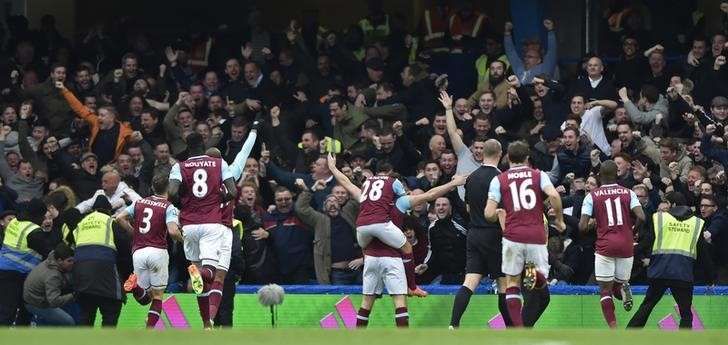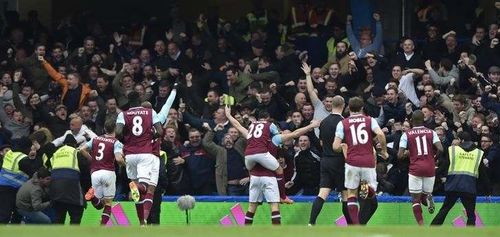
Upwardly mobile West Ham primed for lift-off

By Martyn Herman
LONDON (Reuters) - As the sparrow flies, West Ham United's Boleyn Ground is a mere four kilometres from the Olympic Stadium that will soon be their home but the move could catapult the Hammers into entirely new footballing territory.
A few years after the club were struggling in the second tier and flirting with financial meltdown, boom times are predicted as they prepare to take residence in a 60,000-seater stadium that will be the third biggest in English club football.
With a 200 million pounds ($287.36 million) annual income expected, a charismatic manager and the best West Ham squad seen in recent times, no wonder the likes of Arsenal, Chelsea and Tottenham Hotspur are casting anxious eyes across the capital.
What is more, with West Ham fifth in the Premier League with eight games to go, they could kick off a new era rubbing shoulders with Europe's elite in the Champions League.
No wonder co-owner David Gold mentioned Swedish striker Zlatan Ibrahimovic as a potential close-season signing this week.
"It's a great moment," former West Ham midfielder Joe Cole said this week. "The club is ripe for going in an upward direction. They just need to make the right decisions in the transfer market, get good continuity, and really take it on."
It is all quite a turnaround from Cole's final days at West Ham in 2003 when they were relegated.
West Ham's fiercely loyal fans have not had many reasons for a good old Cockney knees up. Their dreams, as the club anthem "Forever Blowing Bubbles" says, usually fade and die.
Trevor Brooking's headed winner in the 1980 FA Cup final against Arsenal secured their last silverware.
Since then they have flitted between the top two divisions, watched home-grown talents like Rio Ferdinand, Michael Carrick, Joe Cole and Jermain Defoe leave for bigger things while a takeover by an Icelandic consortium almost crippled the club in the late 2000s.
Suddenly, however, they are feeling chipper and the feel-good factor was evident during the international break when 35,000 watched club skipper Mark Noble's testimonial kickabout.
NEW MENTALITY
Former favourite Paolo Di Canio returned for that game and spoke passionately about the changes he has noticed at the club since he left after relegation in 2003.
"The mentality, the methodology, the philosophy has changed completely," the Italian said.
"They were always in the top five in December then after, down, down, finishing 11th and 12th. This time the team have pushed up again. This is because of Bilic. It's not magic, this is a new mentality, a new work ethic."
While Bilic has masterminded West Ham's resurgence on the field with inspired signings such as Dimitri Payet, Manuel Lanzini and Diafra Sakho, owners Gold and David Sullivan have, as Cockneys would say, played a blinder off of it.
West Ham have a 99-year lease at the Olympic Stadium and will pay in the region of 2.5 million pounds per season in rent on top of the 15 million pounds they contributed for conversion costs -- a minimal sum considering the total bill was 250 million.
The tears will flow though on May 10 when they play their final match at their spiritual home of more than 100 years on the edge of east London's Docklands.
Those that have supported them through thick and thin still wallow in the "academy of football" nickname and past greats such as Bobby Moore, Geoff Hurst and Martin Peters who helped England lift the Jules Rimet World Cup trophy in 1966.
A statue marks the greatest moment in England's and West Ham's football history, Moore being lifted skyward on the corner of Green Street and Barking Road -- a gritty London in stark contrast to the manicured Queen Elizabeth Park up the road.
The prospect of swapping the atmospheric Boleyn and its surrounding greasy spoon cafes, Asian tailors, old Queen's Market and grimy pubs for an Olympic Stadium flanked by the designer outlets of the Westfield shopping centre is not everyone's cup of tea.
But even Billy Bonds, the former club captain who bleeds claret and blue, says West Ham could not turn down the chance to become one of Europe's biggest clubs.
"Football has changed since I was playing in the late 70s and 80s, it's big finance now, and if you want to break into that top echelon these days you have to have a lot of money to do it. A 60,000 stadium gives them that opportunity," he said.
"Yeah, older fans will reminisce about Bobby Moore and Trevor Brooking. But it's exciting times."
The Cockney spirit, he says, will not disappear though.
"I asked Slaven how he has managed to instil such a team spirit, and he said to me, 'simple, it's always been there, this is West Ham, it's in the club'."
($1 = 0.6960 pounds)
(Reporting by Martyn Herman; Editing by Toby Davis)